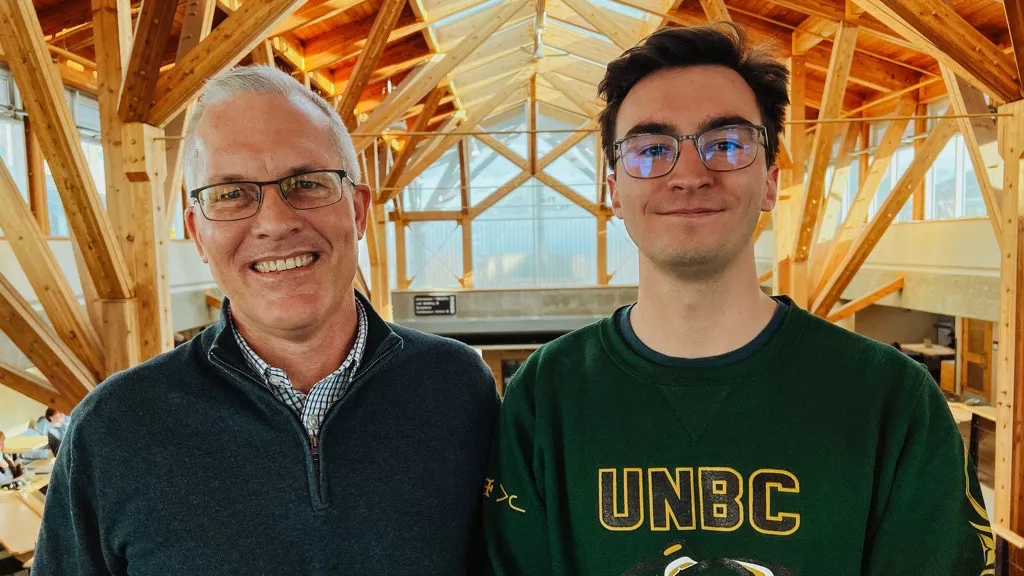From classroom curiosity to published paper
Political Science and Geography student Will Hanlon turned an Undergraduate Research Experience project with Political Science Professor Dr. Gary Wilson into his first co-authored published academic paper.

What began as a chance to sharpen his research skills evolved into a significant achievement for undergraduate student Will Hanlon – a published academic paper.
Hanlon, a Bachelor of Arts student pursuing a joint major in Political Science and Geography, made a connection with Political Science Professor Dr. Gary Wilson when he took Wilson’s comparative politics class. The pair had initial discussions about possible research collaborations and through the Undergraduate Research Experience program were able to secure funding.
Less than a year later, Hanlon and Wilson co-authored an article titled “Crown Dependencies in an era of continuity and change” in the journal Small States and Territories published by the University of Malta.
“I’m so grateful for the opportunity to participate in this project and I’m so glad I did it,” Hanlon said. “The Undergraduate Research Experience program is a great way to learn more about research and work one-on-one with a professor.”
The Undergraduate Research Experience program provides up to 13 awards of $1,500 every year to support student-faculty research collaboration outside of course credit.
For their project, Hanlon and Wilson zeroed in on how the Crown Dependencies have been forced to adapt to the political and economic changes of the United Kingdom leaving the European Union. The Crown Dependencies are three self-governing jurisdictions, namely the Isle of Man as well as the Bailiwicks of Jersey and Guernsey, that are not part of the United Kingdom, but have an independent relationship with the British Crown.
The idea built on Wilson’s existing research interest in the Isle of Man and small island jurisdictions and Hanlon’s desire to study an issue in contemporary politics.
The pair divided the research, with Wilson focusing primarily on the Isle of Man, while Hanlon dove into the issues in Jersey and Guernsey.
“I had no prior experience studying the Crown Dependencies,” Hanlon said. “It was so interesting to learn about the intricacies of their constitutional and political relationship with the Crown.”
First, Hanlon had to familiarize himself with the unique political systems and political cultures that exist on the Channel Islands and through analyzing media reports, government documents and other sources determine how the insular governments reacted to Brexit and what it could portend for the future of governance in the Crown Dependencies.
The first step in presenting their findings took place during UNBC’s 2023 Research Week. The presentation was well received, and the pair submitted, and were accepted, to present at the Annual Meeting of the Canadian Political Science Association, which was part of the 2023 Congress of the Humanities and Social Sciences at York University in Toronto.
When Wilson learned of an upcoming special edition of Small States and Territories focused on the reign of Queen Elizabeth II, he approached Hanlon about putting together a submission and it too was accepted.
Wilson described the project as a true partnership between professor and student.
“We co-researched, we co-authored and we co-edited,” he says. “We both contributed equally to the paper.”
Wilson has worked with other undergraduate students in the past on research projects and their work has been cited in papers published months and years after their work was completed. What made this project special was the pair were able to work together and complete the entire academic publishing cycle, beginning with the idea generation, to research, to conference presentation, to draft paper, to peer review to an accepted paper.
“Will got to see the whole process, from start to finish, in a year,” Wilson remarked.
From learning new research techniques, to putting together a conference presentation, to writing and editing the paper, Hanlon said the entire experience was eye-opening. He says those skills will be helpful as he continues to apply for law school after he graduates from UNBC this spring.
“This experience really helps build my curriculum vitae and prepares the research and writing skills that will be useful in law school,” he said.
Hanlon hopes other undergraduate students will consider applying to the Undergraduate Research Experience program. He says sometimes it can seem intimidating to approach faculty about research opportunities, but in his experience, professors are keen to talk about the possibilities. Wilson concurs.
“Professors are very much open to these opportunities,” Wilson said. “If you’re interested in working with a professor, you should read some of the papers they’ve published and then ask them if they’re interested in partnering on an Undergraduate Research Experience.”